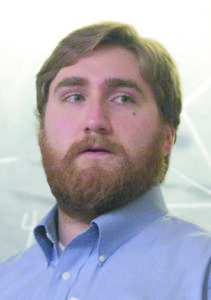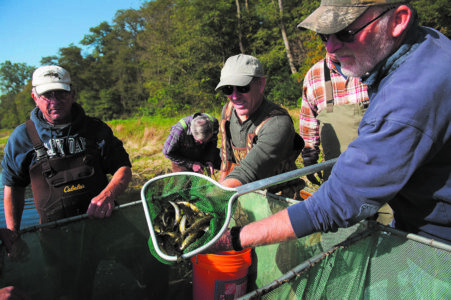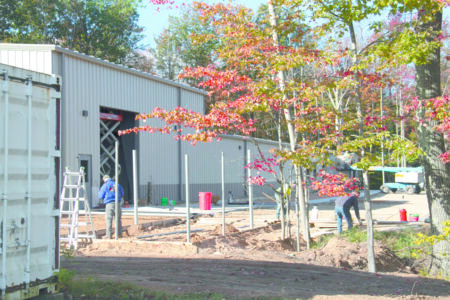Brock Tessman’s final day at Northern Michigan University
He looks back at tenure, university

Pictured are Kristin and Brock Tessman (Photo courtesy of Northern Michigan University)
MARQUETTE – Northern Michigan University’s 17th president passed his final day in office on Monday. Brock Tessman leaves for Montana State University in the following days where he will serve as its next president. Tessman spent some time looking back on his presidency, what NMU’s student taught him, what he hopes for the future of Marquette and for what the next NMU president will be like.
Before he left, Tessman and his wife, Kristin, donated $50,000 to the NMU Foundation to establish the Student High-Impact Practices Fund, which will support mini-grants for faculty to design experiential learning opportunities including internships, research, capstone projects and fieldwork experiences.
The fund will also help alleviate student expenses associated such experiences for individual students facing financial hardship. This came to fruition just a week before Tessman’s final day at NMU, though it is almost like a parting gift as the fund has been in the making for a long time prior to his departure.
“We want to do the gift because the gift is important, not because we are going to be here,” Tessman said. “It’s not farewell, we will be keeping a close eye on the students impacted by our new fund. In a way we will never leave this place … to the lake, to the Independence Day Parade, to Frosty Treats, or Vango’s or all the people we have met all along the way. There is something very special about this community and this campus.”
Tessman said that leaving campus and Marquette County will be hard for him and his family. He finds that though he has only been here for a few years, that he loves the area and that is due, in part, to how welcoming the people of Marquette and the Upper Peninsula were when he first arrived.
“For the community, I ask that they be just as welcoming to the next president and make all of the assumptions about them becoming lifelong Wild Cats,” said Tessman. “Not just in spirit but what I hope to be a longer tenure (than mine.) I’ve been very candid about that, I don’t think the timing here was fortuitous I don’t think its good for the campus, I don’t think its good for the community, I don’t think its really actually good for my family. Yet the decision is a good one for us and yet there have been so many good things that have happened, there have been so many positive connections built between Northern and the community. Even things that don’t last very long can be very positive.”
Tessman has a history of working in Montana, having spent nearly 10 years working in academia and administration there. Though this is a return to his roots, in a way, he finds that moving from NMU was a hard decision but the university will continue on.
“The bottom line is, no matter who the heck the president is, Northern keeps on going,” said Tessman. “We just did the 125 anniversary. If there is one lesson from that its that through all the ups and downs Northern keeps on going. It’s going to be fun to see what happens next at the university.”
The next president for Northern Michigan University is still unknown, but Gavin Leach will serve as the interim president and help the presidential search for the 18th president of NMU. Tessman hopes that whoever is picked will do their best to connect with students.
“Northern needs a president who is hard wired to engage on a human level,” Tessman said. “Just like we need faculty who believe it is their job to work beyond the lecture, it is their job and their responsibility a Northern Michigan University faculty member to take extra time with students and support them. The same goes for the president … I hope that when the new president comes in, he or she will really enjoy that part of the job.”
Tessman found that students had a deep impact on him during his time as president. In particular, the Pro-Palestine Encampment held at NMU in April of 2024. He found the student demonstrators to act in a perfect way, following guidelines and still making their demands.
“The way that they stayed within the lines and kept pushing for what they wanted, those are lessons I can take with me to union negotiations, legislative negotiations and more,” said Tessman. “Age has no monopoly on good strategy and brilliant ideas and that group taught me a lot because they challenged me a lot.”
Another impactful moment was the most recent commencement ceremony this spring. Tessman found that this was the first year were he really saw students he connected with, graduate and the small moments they shared on stage to mean a lot.
“That opportunity to have that moment, it’s usually about three or four seconds but there is a mini conversation that happens,” Tessman said. “With every student that comes across, it is a little different. You can tell that a student is really excited and nervous or terrified to be on stage, not everyone is super excited to shake an administrator’s hand and that is an important lesson as well … So there is twelve hundred mini moments and exchanges and relationships built into that. A cool thing this year, kind of two and a half years in, I knew more students than ever in this commencement. Kind of going through that where every three, or four or five students I knew and what that moment means for them. It’s the best job in the world, its a hard job but it is the best.”
The sheer number of people who were at the Superior Dome cheering on their graduating family and friends was another impactful moment for Tessman, who said that he has yet to find a university that has that much familial and friendly support. That along with the real diversity on campus has had a deep impact.
“Politically and intellectually this campus is much more diverse than some of the down-state campuses,” Tessman said. “I don’t think anyone person on campus, be it the president or the student, can speak on behalf of the whole university … There have been times that have been difficult for me, there are moments when you are put in a position where you have to speak for the university. In reality, the university is this complex heterogeneous place where there is no one voice that can capture the sentiments of everyone.”
One of the difficult moments in Tessman’s presidency was when he sent a letter of support to the Copperwood Mine Project near the Porcupine Mountains State Park.
“I think sending that initial letter of support at the time felt like the right thing to do,” Tessman said. “This goes without saying but there are many positive things that would be associated with the involvement of that mine. So there are lots of reasons to support it, but there are also lots of reasons why people are fiercely opposed to that mine. Ultimately, through some learning on my own and with additional conversations with students, with faculty, with community members and others it became obvious to me that the mix of sentiments on campus was such that it was not possible to say that the university felt firmly one way or the other. So the right thing to do was say, ‘Look, we are rescinding that letter of support because I can’t say that’s how the university feels.’ That was painful and a lot of people were and are upset about that, and I get it.”
Overall Tessman looks on his time at NMU fondly, having grown along with the university and surrounding city of Marquette. With the final question of his interview, Tessman was asked if he could offer any lasting advice to NMU student’s, faculty or residents of Marquette to guide them during this period of change.
“I think that this is true for universities for higher education in general and it is true for developing communities, not just Marquette. That uncertainty, it’s going to require agency, productivity, the ability to embrace change, take risks along the way but that is what it means to be a human being,” Tessman said. “Life is not being along for the ride, it’s not letting things happen to one’s self, higher education and being a successful university is not being along for the ride and kind of waiting … You’ve got to shape those things. I am a big believer in campuses like Northern being responsive to workforce demand. We have to make sure we train students for the jobs the market is generating. Universities should also help shape the discussion around what types of jobs we would like to have out there. We should be debating what it means to be a human being in the 21st century and what kinds of jobs we would like to see created. I think the university as a whole needs to take ownership of its future and be very open to change even, if it is uncomfortable. For Marquette growth is coming, point of fact. It will happen here. So instead of waiting to see what that growth looks like and deciding whether you like it or want to complain about it, realize this is an opportunity to jump in and help design what that growth looks like …. I think anything is possible for this place but it requires everyone’s participation in order to write the future in a way the community wants it to and the way campus wants it to. Believe in your ability to shape the future, that is the answer to your question.”
Antonio Anderson can be reached at 906-228-2500, ext. 550. His email address is aanderson@miningjournal.net.






